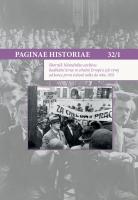Kominterna - "třetí období" a jeho vliv na KSČ
The Comintern – ‘The Third Period’ and Its Influence on the Communist Party of Czechoslovakia
Author(s): Peter PopálenýSubject(s): History, Political history, Recent History (1900 till today), Interwar Period (1920 - 1939), History of Communism
Published by: Národní archiv
Keywords: commintern; Communist party of Czechoslovakia; Czechoslovakia 1918-1938; political parties
Summary/Abstract: In the interwar period, the Comintern was one of the few international organisations that strongly affected political affairs in other countries. From its foundation in the spring of 1919 it developed its centralised and supranational form to cover and control a wide spectrum of radical leftist groupings. In practice, the Comintern was a union of national communist parties as well as the only global integrating political party pursuing a united strategy for the entire communist movement. Its close ideological and political bond to the Soviet Union, further related to the rather significant economic dependence on Moscow leaders, was its principal feature. In the upshot, the ideological and economic dependence of the national sections led to the asymmetric position of the Soviet communists and their All-Union Communist Party (Bolsheviks) towards the member sections. Basically, in this situation, the Comintern primarily represented the interests of Soviet communists and, on the other hand, reflected a factional skirmishing within the All-Union Communist Party (Bolsheviks). The Comintern was developed and formed in stages that brought many substantial changes and turnabouts. Each of these periods had an impact on the national sections. The ‘third period’ lasting from 1928 to 1933 and involving the Sixth and Seventh Comintern Congresses was a crucial period of the development of the Comintern as well as the entire communist movement. The on-going All-Union Communist Party (Bolsheviks) conflict foreshadowed the crucial shift ‘to the left’ and the commencement of the ‘class against class’ policy in an attempt to ultimately bolshevise the national sections. The struggle against non-bolshevism combined with simple jockeying for power inside communist parties brought many of them to the brink of collapse. It was no exception in many countries that anti-systemic communists were viewed as posing the same, or even a bigger, threat to democracy than fascists or Nazis. The shift in the Comintern politics did not come until the international political events associated with the grasp of power by the Nazis and fascists; however, even this partial change emerged too late. The ‘third period’ was marked by a crucial change of the Communist Party of Czechoslovakia that became a loyal Bolshevik national section. Many members with the social democratic past, intellectuals, and opponents of rigorous bolshevisation left the party. Critics were silenced or excluded regardless of the apparent variance between the Comintern requirements and the political reality in Czechoslovakia. Compared to other significant sections, the Czechoslovak Communist Party leaders retained the intransigent anti-systemic rhetoric. It was not until the results of the Seventh Comintern Congress and the adoption of the people’s front principles that the official policy of the Communist Party of Czechoslovakia underwent a cardinal revision.
Journal: Paginae Historiae
- Issue Year: 32/2024
- Issue No: 1
- Page Range: 15-34
- Page Count: 20
- Language: Czech

